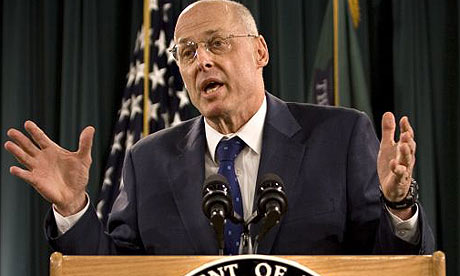Report on Wall Street banks' bailouts says US Treasury misled public
Neil Barofsky, the inspector general for the Troubled Asset Relief Program has criticised US Treasury officials for making optimistic statements last September, at the height of the financial crisis
- guardian.co.uk, Monday 5 October 2009 17.10 BST
- Article history
Henry Paulson has come under fire for US Treasury's handling of the credit crunch in the final months of Bush administration. Photograph: J Scott Applewhite/AP
The US Treasury misled the public over the health of struggling Wall Street banks receiving emergency funds at the height of the financial crisis, creating unrealistic expectations and undermining popular trust in bailout efforts, according to an official audit.

An inspector general appointed to oversee the US government's banking bailout has singled out president Bush's treasury secretary, Henry Paulson, for painting an excessively rosy picture of the condition of institutions such as Bank of America, Citigroup and Merrill Lynch when the government pumped $125bn (£70bn) into America's ten top banks in September last year.
At the time, Paulson described the banks as "healthy institutions" and said that an injection of government cash would kick-start lending in the economy. But officials in both the Treasury and the Federal Reserve had private concerns that some of them were teetering close to a financial collapse.
"The Treasury may have created unrealistic expectations about the institutions' condition and their ability to increase lending," says a report today by the inspector general, Neil Barofsky, who adds that the Treasury and the bail-out program "lost credibility when lending at those institutions did not in fact increase".
He continues: "Accuracy and transparency will enhance the credibility of government programs like TARP [the troubled asset repurchase plan] and restore taxpayer confidence in the policy makers who manage them; inaccurate statements, on the other hand, could have unintended long-term consequences that could damage the trust that the American people have in their government."
The Federal Reserve's chairman, Ben Bernanke, and the head of the Federal Deposit Insurance Corporation, Sheila Bair, are criticised for similarly optimistic remarks in the findings, which will add to a vigorous debate about the handling of the credit crunch in the final months of Bush administration.
As the global financial system wobbled in the fallout from the collapse of Lehman Brothers last year, the US government summoned the bosses of America's top banks to Washington and told them that they were getting injections of Treasury money, whether they liked it or not.
Paulson and Bernanke opted to pump funds into all ten of the country's top banks to avoid creating "haves" and "have nots" that would highlight those considered to be in a more perilous state. In doing so, they tried to talk up the condition of every big institution.
Several banks, including Goldman Sachs, JP Morgan and Morgan Stanley, have since repaid government aid and freed themselves from restrictions over dividend payouts, bonuses and the recruitment of foreign staff. But others, such as Citigroup and Bank of America, are still dependant on Treasury support.

No comments:
Post a Comment